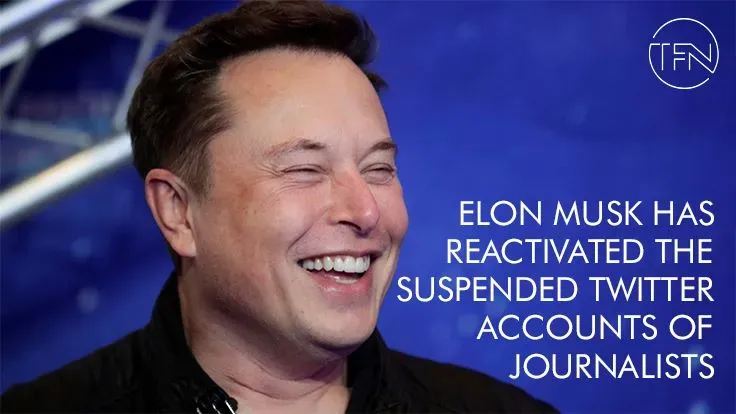A disagreement over releasing public data on the billionaire's jet led to the suspension of many journalists' Twitter accounts, which Elon Musk has reinstated.
Government officials, advocacy groups, and journalistic organizations all expressed outrage at the extraordinary bans, with some claiming that they were endangering press freedom.
Musk defended the suspension of the accounts on Thursday, claiming that the media had put his family in danger by "doxxing," or leaking, nonpublic details about his whereabouts.
On his Twitter account, he then posted a poll asking people how long they thought the accounts should be suspended. Later results revealed that the majority of respondents want a rapid account restoration.
"The people have had their say. Accounts that doxxed my location will no longer be suspended,” Musk tweeted on Saturday.
Reporters from The New York Times, CNN, and The Washington Post were among the journalists who had been suspended; they have now been restored.
Officials from France, Germany, the United Kingdom, and the European Union had criticized Musk, who calls himself a "free speech absolutist," and denounced the suspensions.
Roland Lescure, the French Minister of Industry, said on Twitter on Friday that he will stop using Twitter after Elon Musk banned journalists.
The suspensions left UN communications chief Melissa Fleming "very upset," and she tweeted that "media freedom is not a toy."
Twitter was alerted by the German Foreign Office that actions that threatened press freedom were problematic.
Musk's electric vehicle business Tesla was impacted by the decision, and on Friday, its stock fell 4.7%, registering its largest weekly loss since March 2020.
Dispute around ElonJet
The accounts were suspended after a dispute arose over a Twitter account named ElonJet that used publicly accessible data to follow Musk's private jet.
Previously, Musk affirmed that he would not revoke the account on the grounds of free expression. However, Twitter halted it and other services that monitored private planes on Wednesday. Shortly after, Twitter revised its privacy policies to forbid the dissemination of "live location information".
The same doxxing laws apply to 'journalists' as to everyone else, Musk stated on Twitter. "Criticizing me all day is ok, but doxxing my real-time whereabouts and endangering my family is not."
Musk subsequently claimed that journalists had posted "essentially assassination locations" against the terms of service of the site, although he offered no proof for that assertion.
One of the suspended journalists, CNN's Donnie O'Sullivan, said he had not disclosed the exact live position of Musk's plane.
Private websites like FlightAware and Flightradar24 often release the flight tracking information gathered by the US Federal Aviation Administration online.
Ella Irwin, the director of trust and safety at Twitter, said that the team personally checked "any accounts" that posted direct links to the ElonJet account in violation of the new privacy policy.
Irwin said in the email, "I recognize that the emphasis seems to be mostly on journalist accounts, but we implemented the policy equally to journalists and non-journalist accounts today."
Musk has reduced Twitter's personnel, changed its moderation procedures, and reinstated previously banned accounts, including those of former US President Donald Trump, after acquiring the network in a $44 billion acquisition in October.

